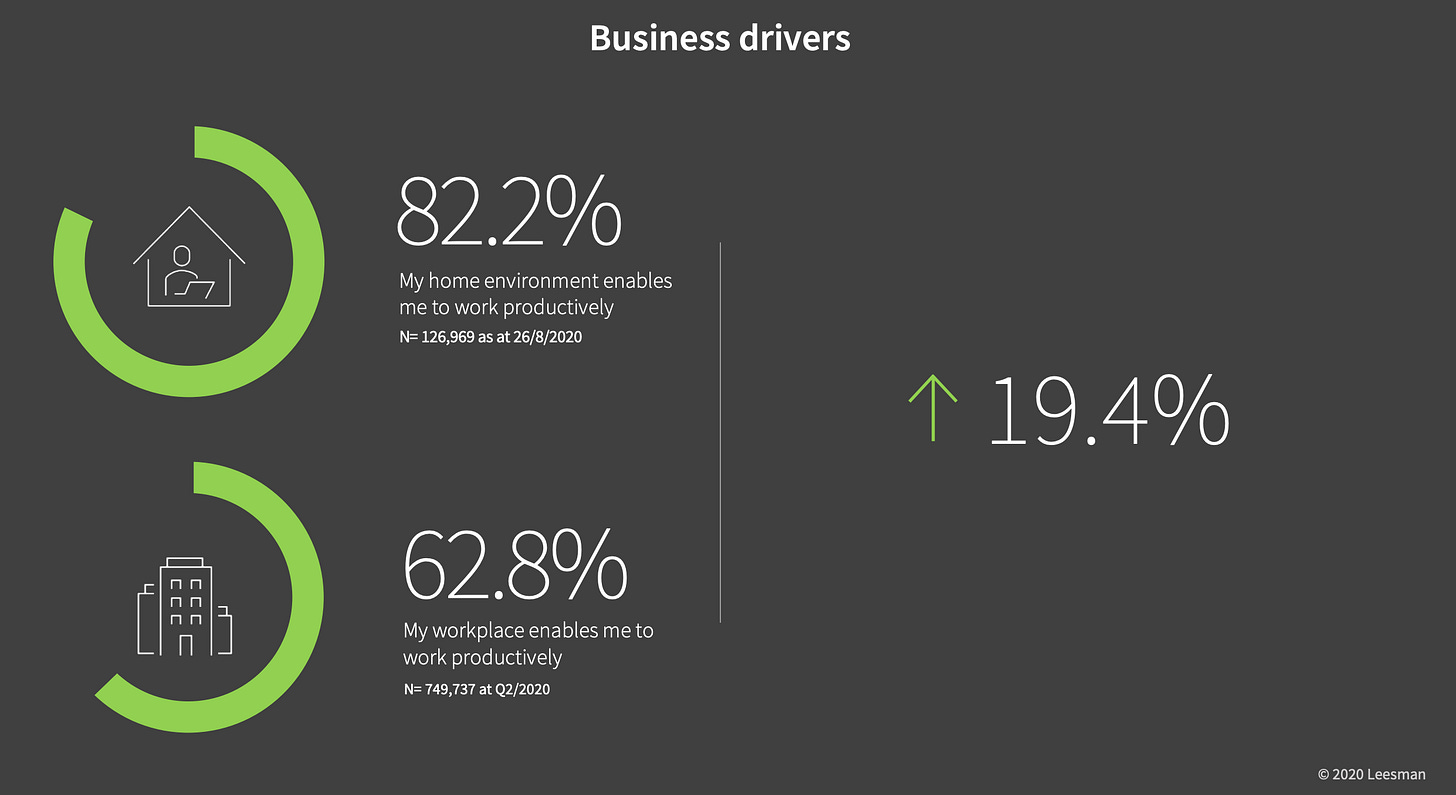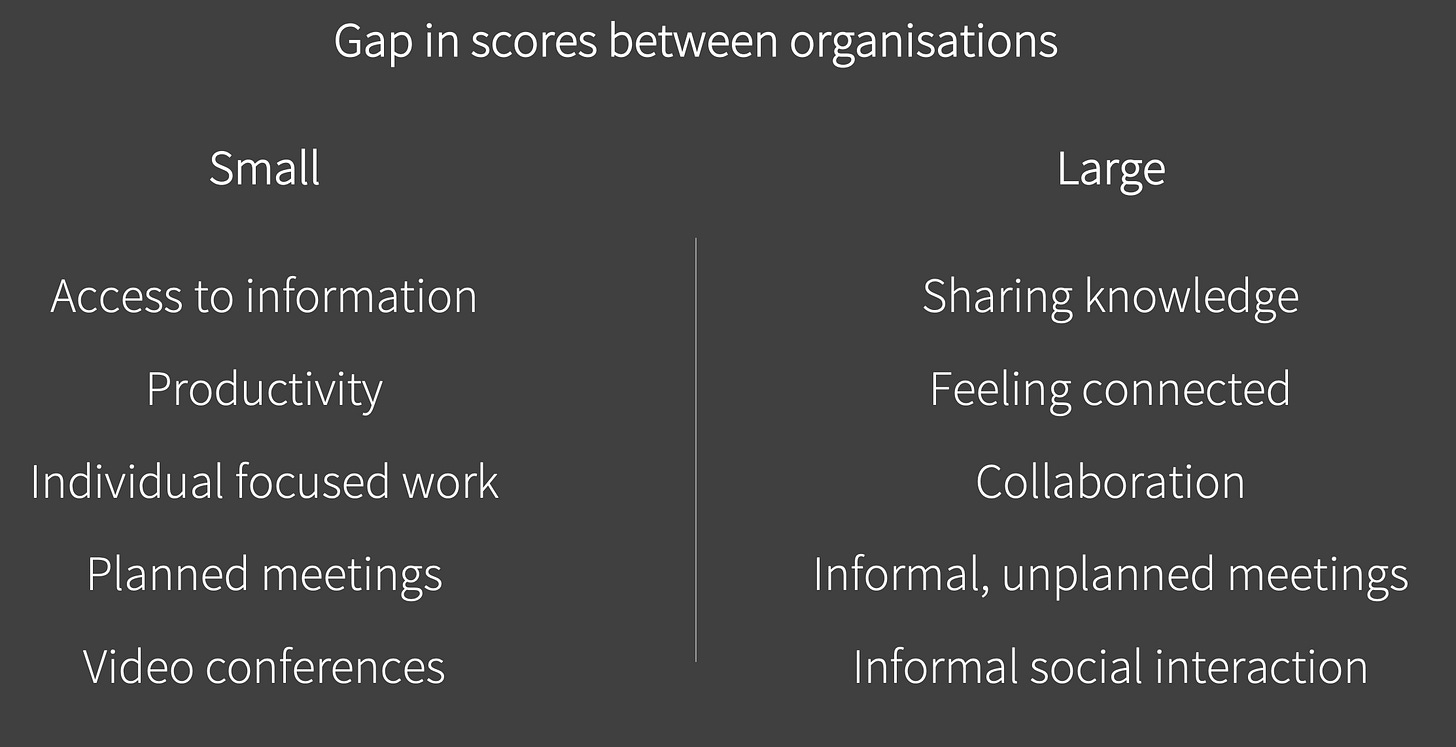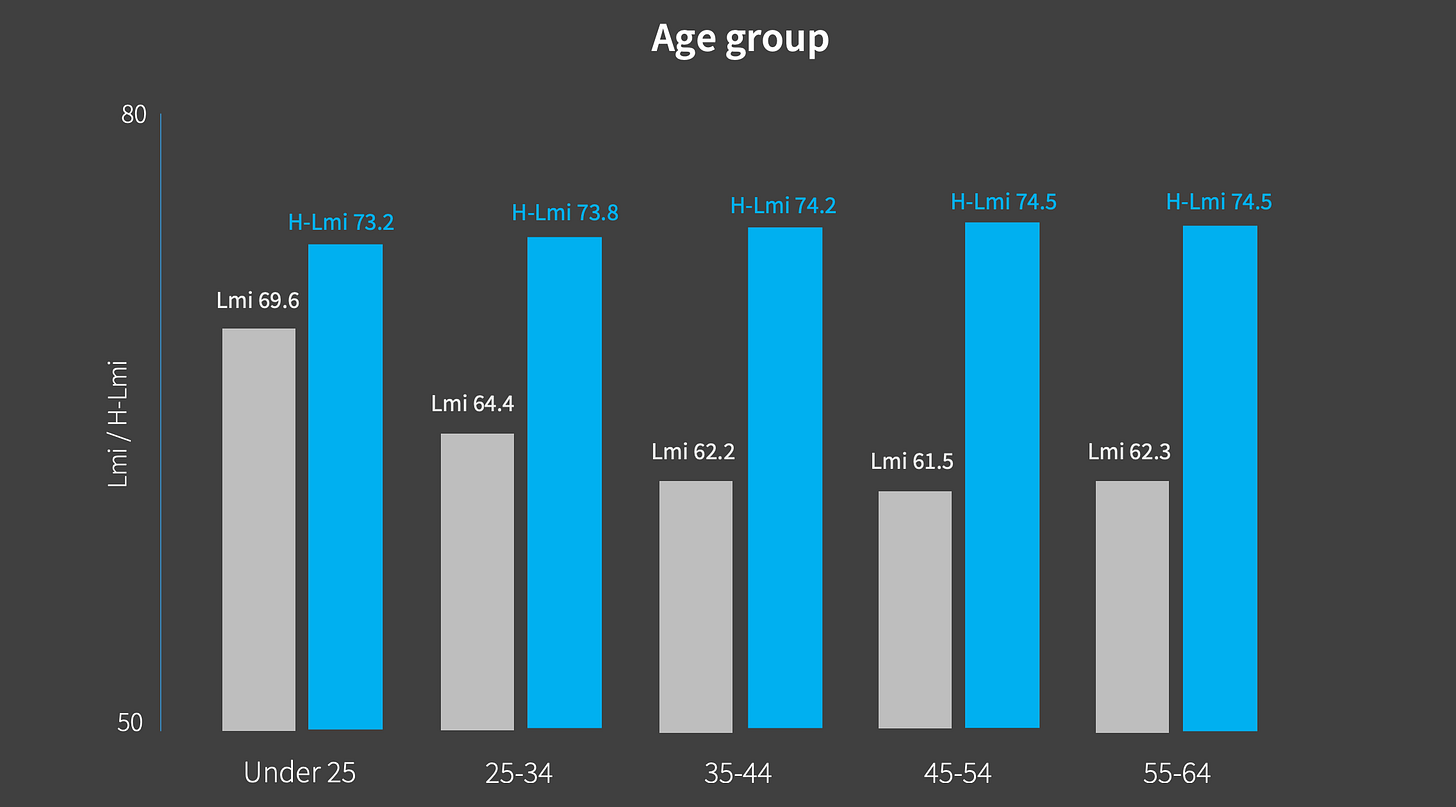Home working - the data is in
ALSO: more on our culture becoming our tech // community // the week in tweets

Image by Shane Rounce on Unsplash
Thanks to everyone who shared Make Work Better with like-minded colleagues, the newsletter added another 250 readers last week. If you enjoy the content, please do share it on your socials using the link makeworkbetter.substack.com or forward it to a colleague.
I was fortunate to attend a briefing by the Leesman Index last week. Leesman run one of the biggest workplace surveys in the world, measuring employee engagement - and whatever causes it. Their objective is to arm organisations with data and insights that help them create outstanding workplaces. You can find more about them at their website.
If you don’t want to read this bit here’s the TL;DR:
people unequivocally feel way more productive at home
biggest differentiator between firms is the amount that workers feel connected
every age group is happier, some are much happier
the least happy are those who use to have private offices
With Leesman’s permission I'm sharing some of the findings here. The Leesman Home Working report looked at data from 125,000 respondents across 83 different countries (representing 870 different companies). The data was gathered between the end of March and the end of August 2020.
They aggregate data into a measure - the Leesman H-LMi (the satisfaction with working from home). And during that time period the overall score of satisfaction for workers working from home was 74.2 (this is out of 100). In normal times if Leesman assess a firm, a score of over 70 is regarded as 'outstanding'.
They then asked workers, does your home environment enable you to work productively? 82.2% said yes, compared to 62.85% for the office (a throw back to the wretched open plan days, no doubt).

To put this score in context, the survey also clusters the very best firms into an aspirational cohort that they call Leesman+. The satisfaction of being in offices for the Leesman+ firms was 78.3%. In that context the 82.2% average of all homeworkers is almost 4% better than the best of the best in offices. Unequivocally people feel productive at home.
Back to the H-Lmi scores, as ever, happiness is not evenly distributed. The top performing organisation scored an H-LMi 82.5, the lowest performing scored 52.0. They wanted to understand the differences.

The small gaps are the things that most companies are about the same on. The large gaps are the differentiators. Some firms are making people feel connected, making them feel like they are collaborating, that they can still chat informally to the bosses - and the worst performers are failing at these things.
Is there a generation gap on this? Yes. But it's not quite what you might think.

The first bar is how happy age groups were in the office before. Younger workers were ok with the office, relatively, but they are more happy with working at home. Older workers hated the office and they are yampy with delight about the option of having the run of their lavish properties now. But the headline is every group is happier, some are much happier.
Follow-up: do our communication tools define our culture?
I asked this question last week and got an interesting response. Someone said to me:
‘yes, they do - and it’s hell. It’s got to the point now with [the in-house tool they use] where if people aren’t online for an hour they have to put a status to say they aren’t there for an instant reply. If you message someone and they don’t reply within 3 seconds you can ‘buzz’ them so they get an alert forcing them to read your message. Hell’.
On LinkedIn someone said:
We have a Whatsapp group for 250+ people for non-work stuff, Slack for work & conversational, agile comms, email for bigger/strategic updates. The type of channel matters
Of course the challenge of using Whatsapp is that there’s no Out of Office mode. I’ve heard that people at organisations that use it find there’s no switching off from it. Sometimes the best thing about a holiday is that you fully switch off from the day-to-day of your work.
Another commenter added how our calendars shape our culture more even than our comms tools:
Jason Fried was talking on the Rework podcast recently about the influence of the Outlook calendar, and how it encourages a meetings culture. It reinforces the expectation that if you have a gap it's fair game to be filled by someone else's priorities. It takes a strong workplace culture and discipline not to be impacted by the tools we use, especially as most individuals and organisations just leave them on default settings.
In the same vein, the British fashion retailer Next called out how colleagues doing Powerpoint over Zoom is a massive buzz killer.

They do know they’re in charge of this, right? (Thanks to Bill Griffin for the link on this one).
The week in tweets
Some good replies to this one.

Charlotte here gave some gloomy, but vivid predictions about how grim the 2nd half of the year is set to be.

More positively Ben Goldacre has a 'ten to’ hack.

Management icon Tom Peters (who went into the Hall of Fame with his tweet to Simon Sinek) was asked about his secret of giving presentations:

As ever, if you use Twitter the Make Work Better Twitter list gives you hundreds of fresh insights into workplace culture, every single day. Pin it to your timeline and swipe into it when you want to blag a brainy hot take.

New podcast today - the first of four podcasts about what’s next with work - specifically how can we make work feel like a community again, especially when you’re hunkered down under the duvet trying to survive the November chill. Over the next few weeks I’m going to be chatting to:
Sarah Drinkwater who is a supreme community builder (and who inspired the whole series with her blog post about how every company should be seeking to hire a Community Manager)
Abadesi Osunsade who has just been hired as VP Global Community & Belonging at Brandwatch (power title, power player!)
Jillian Richardson, founder of the Joy List a mega successful way to get strangers together in New York and author of Unlonely Planet
Casper ter Kuile who is a legend of community building as his fantastic new book Rituals can testify
I’m so thrilled with the guests I’ve managed to land to come along to talk about how we can feel connected to others again - and it’s not just a consensus, there is some spiky debate along the way. The first episode had to kick off with Sarah Drinkwater, listen on Spotify, Apple or via the website. It’s all free, but if you love it, share it.

Facebook have now banned workplace politics from their Workplace tool. I’m enjoying the way this is playing out
Is that Zoom fatigue or existential dread? (there was a similar piece a couple of months ago but it’s a good read)
Make Work Better is created by Bruce Daisley, workplace culture enthusiast. You can find more about Bruce’s book, podcast and writing at the Eat Sleep Work Repeat website. Thanks so much for the overwhelming response to my offer to come and talk - for free - about the climate emergency at your workplace, I’ll be talking to 1500 individuals in the first couple of weeks of October.




